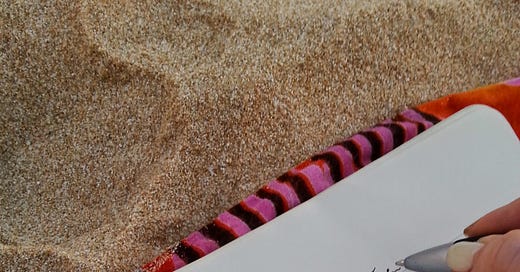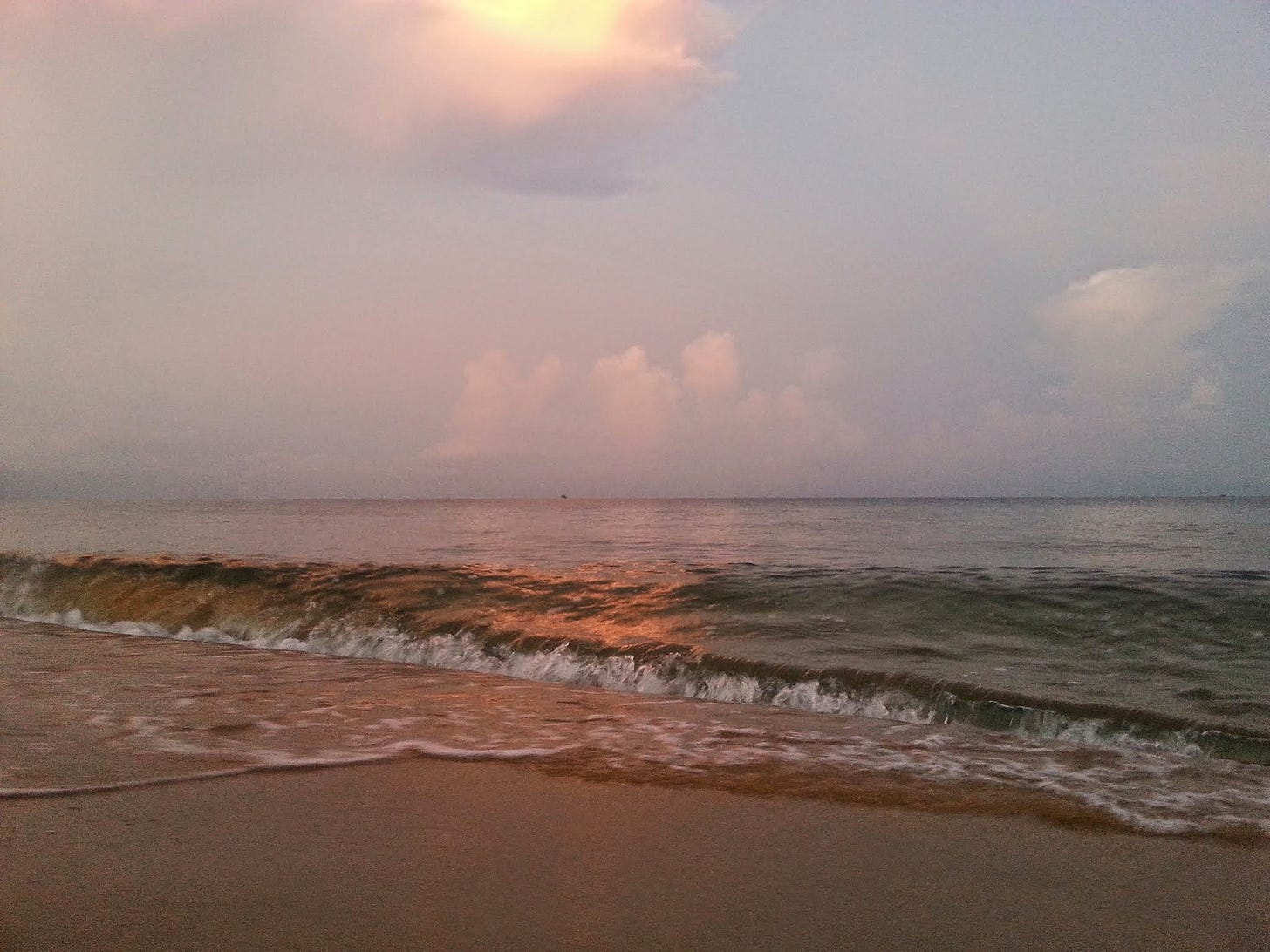Notes From an Island in Time
My unedited journal from the 40th anniversary on Phu Quoc Island, Vietnam
This, then, is the writing of this day:
April 30, 2015
Writing session #1
5:45am
As I set myself down on the sand in the early light, I decided to start the day with a letter to my father:
Hi Dad,
I am sitting on a beach not too far from where you were 40 years ago on this day, trying to get off the island. The Gulf of Thailand is so calm it is hard to imagine the chaos that Saigon had been in–for the abandoned Vietnamese this morning forty years ago and for the Americans that last night.
Writing this history has felt at once like flying on the wings of angels and stumbling in the dark. I seem to be feeling exceptionally uninspired at the moment — perhaps as you must have after the night in the open, fearing a gunfight, unsure if your transport to the American Challenger was going to succeed.
There is a thunderstorm over Cambodia right now, just on my sight horizon, and a moment ago a brilliant flash of light in the menacing dark clouds was followed immediately by a deep drumroll of thunder. It almost sounded like bombs falling, but that time is over in Vietnam, now as it was by then.
Some day I will be telling people about this, how I sat on the beach 40 years after your heroic effort to save your employees, your people. How it was a “lost evacuation” ~ everyone knows about Saigon, but almost no one knows about you and Phu Quoc. How over 1000 lives had a chance for a new future because of you.
This trip, this voyage, this sojourn is so important, not just to retrace your footsteps but to also immerse myself in my own experiences in relation to this story, so that from the two I can weave a new telling. This new dimension will be as near to the factual truth as humanly possible and, combined with my own “sense” of things, can perhaps bring the tale alive in a way that extends the life of the story and reveals its meaning and why it has had such a hold on me these past three years.
Dad, you said at the end of a letter to mom, “If we make it, it will be an odyssey worth writing a book about — if we don’t make it, it still will.”
I’m glad you made it, Dad! And I am sorry you were not able to write a book about it. I hope I am able to, for you.
end session
6:53am
New writing session #2
9:00am
It is 9am on April 30th on Phu Quoc Island in Vietnam. By now, in 1975, the last helicopter transporting the last Marines had left the American Embassy in Saigon (7:53am). President Gerald Ford had long since declared the evacuation a success.
My father was just now leaving the beach in an LSU with 500 of his people and his best friend and colleague, Robert Sands (who incidentally, shares my birthday).
He wrote of that night later that week on a small scrap of page-a-day calendar:
“[South Vietnamese Naval] Captain Thien put his family aboard Challenger causing some panic on base and general alarm which put all vessels to sea without lights. Also caused us to disembark after loading two Mike [landing utility] boats. Much tension because of menacing naval guards with M-16s facing our Nungs [minority soldiers], also with M-16s. Sands, Thinh [translator] and I were also armed with handguns. Tension grew when Hamm’s jeep was fired on for not stopping at the base [entrance] and all M-16s were clicked into firing position. Our people were well disciplined and I had all the heads down and gun drawn to put out the spotlights if necessary.”
Morning dawned and Captain Thien was found to order the naval guards to stand down and so my father was able to reload the Mike boats. He wrote to my mother later: “The deadline for all Americans to be out of Vietnam was the previous noon so were presumably about the last Americans out of the country with Joe Hamm possibly the last.”
While arriving at the awaiting Challenger should have allowed them to sigh their well-deserved sigh of relief, there was yet another hiccup. He wrote in his review notes: “Slight scare when Mike crew and Challenger differed on which side of ship to board. Some feared we would be put back to shore. But [our skipper] was finally persuaded and hauled into starboard.”
It is now 9:18am, my second cup of coffee is about gone, my crepe mostly eaten, my daughter is by my side and I am, once again, looking over a placid sea (the Gulf of Siam as my mother referred to it). It is so different to that scene of four decades ago and yet there does feel a rightness, a symmetry to this somehow.
I had thought about staying up all night to keep a vigil on the beach. But I felt that this would inhibit my writing more than enhance it so I opted for a short midnight visit and starting the day before dawn.
As I sit here writing in this pastoral scene, I cannot help but think that my dad is looking over my shoulder, glad that I have not suffered a sleepless night at the mercy of illness-ridden mosquitoes and God-knows-what-else. Glad that I am writing about his story, one he was never able to write.
My father’s colleague, Charlie Taber, who had made it to the Challenger the night before, said in his memoir that my father and Sands arrived exhausted but “all smiles.”
That was my dad, serious in his endeavors but all smiles in his relations. I can’t help but think he is smiling right now.
end session
9:25am
Writing session #3
1:45pm
It’s approaching the 2pm hour here in Phu Quoc. I am back at the beach sitting under a thatched umbrella upon a slatted wooden longue chair. We have just eaten sautéed yellow noodles with seafood and garlic crab stir fry.
The afternoon heat is radiating from the sand and feels like an open oven door. Only the persistent breeze keeps us from retreating to our cool tiled room. I cannot imagine how hot it would feel on the deck of ship with no umbrellas or refreshment. Add to that no facilities (yet) and no personal belongings (to be recovered ever) and I think it would be almost unbearable, despite the relief of rescue.
At this time of day, 40 years ago, technician Joe Hamm heading over calm waters to the Challenger. He was bearing bad news. Though my father’s employees had succeeded in getting peacefully beyond the potentially angry locals, the baggage had not fared so well. Hamm had stayed behind to oversee the transport of the goods after helping the second group off, and when he returned to the base, he found that “refugees had broken into camp and were looting the baggage and equipment…”
My father wrote to my mother about the harsh development: “[Hamm] was to return with trucks for our baggage but soldiers, prisoners from a nearby camp and refugees had already gone amok and were hacking it all to pieces with machetes. So we lost almost everything. As did many others, I had only the clothes on my back–a blue shirt and my gray Levis cut off to make shorts. So now I presumably have less than I did when I was born . . . I regret the loss of everybody’s property–but we did get them out alive which is more than I would have been able to say had we remained in Saigon.”
A little old Vietnamese woman is primping my toes. She had approached me as I began this entry and what with her entreaties and with the state of my nails after a long winter, too many hours on my feet at work, and too many task at home (writing, homework, moving house, and prepping for Vietnam), I succumbed to a pedicure.
“So white,” she says.
“Huh?” I reply.
“So white.” She pats the top of my feet.
“Oh, yes,” I laugh. “I know. I know!”
I had notice their glaring luminosity as I swam this morning. It was hard to believe how white they were; they were almost blinding. They looked just the way my father’s had looked when we moved to Hawai’i in 1976 after he retired. I thought of him on the Challenger with all that heat and sun and wondered how he, too, had survived that.
end session
3:45pm
Writing session #4
6:23pm
The sun has just set here on Phu Quoc Island. I am sitting on the porch of my “bungalow” slathered in bug spray, hoping that one thin sliver of a disease-ridden mosquito proboscis does not slip between the noxious insecticide. Malaria or dengue fever would put such a crimp in my writing endeavors.
By this time on April 30, 1975, the American Challenger had taken on thousands of additional fleeing Vietnamese as per a late afternoon order from U.S. Command: “Take as many refugees as you can carry.”
A week earlier the Attorney General in Washington had signed the law allowing 50,000 Vietnamese (plus relatives) into the states as immigrants. Though, and perhaps because, so many had been left behind in Saigon, there was a sense of urgency now to give safe passage to those people that the US had so instilled with such a deep fear of communism. The fact that some worthy American Embassy employees ended up being left behind in the last frenzied airlifts while “a motley crew of fisherman and villagers and two-time refugees from Cam Ranh” made it out on desperate flotillas certainly must have caused my father some chagrin.
Additionally, the influx of additional bodies pressed in on his people, who had already made their peace with being “housed” on the bare deck. “Much jockeying for places on deck,” he wrote in his review of the events. “Common kitchens set up and our people got short shrift by swarming refugees.”
The American Challenger would weigh anchor as the darkness of April 30 deepened, now carrying over 5,000 Vietnamese–5,000 people who no longer had a country to call their own.
end session
7:20pm
Postscript
9:58pm
Though the task of writing about the hardships my father and his people faced is a sobering one, I felt such a sense of elation and propitiousness writing about it today, here in Vietnam, here on Phu Quoc. I do not know what will come of all this, but I am glad that I am here and I am telling the story as I can, bit by bit.
As I had finished writing that last sunset entry, I’d looked up at my daughter and said, “It has been the best day.”
Oh, the power just went out . . . hmmmmm, about posting this tonight . . . I guess that may not happen . . .
end session
10:03pm









